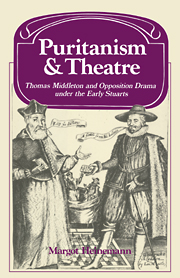Book contents
- Frontmatter
- Contents
- Introductory note
- 1 Time and Place
- 2 Puritanism, Censorship and Opposition to the Theatre
- 3 Middleton as Satirical Journalist
- 4 Early Satirical Comedies
- 5 How Anti-Puritan are Middleton's City Comedies?
- 6 Money and Morals in Middleton's City Comedies
- 7 Middle Years: Tragi-comedy and Moral Comedy
- 8 City Employments
- 9 Hard Times and Hengist, King of Kent
- 10 Political Satire: A Game at Chess
- 11 City Tragedy
- 12 Drama and Opposition, 1619–1640
- 13 From Popular Drama to Leveller Style: a Postscript
- Appendices
- Index
2 - Puritanism, Censorship and Opposition to the Theatre
Published online by Cambridge University Press: 03 November 2009
- Frontmatter
- Contents
- Introductory note
- 1 Time and Place
- 2 Puritanism, Censorship and Opposition to the Theatre
- 3 Middleton as Satirical Journalist
- 4 Early Satirical Comedies
- 5 How Anti-Puritan are Middleton's City Comedies?
- 6 Money and Morals in Middleton's City Comedies
- 7 Middle Years: Tragi-comedy and Moral Comedy
- 8 City Employments
- 9 Hard Times and Hengist, King of Kent
- 10 Political Satire: A Game at Chess
- 11 City Tragedy
- 12 Drama and Opposition, 1619–1640
- 13 From Popular Drama to Leveller Style: a Postscript
- Appendices
- Index
Summary
That Parliament in 1642 ordered the theatres to be closed is probably the best-known fact in English theatrical history. And since the Parliamentary Puritans were then in power, all critics of the theatre are commonly assumed in literary history to be Puritans, and all Puritans hostile to the theatre, as if the two things were synonymous.
The identification of Puritans and Parliament with total hostility to art, culture and beauty has become almost axiomatic. It is, indeed, so integrated into the language that to speak of Puritans who were not ‘puritanical’ sounds like splitting hairs (though it is what contemporaries often did). The popular notion of Puritans in literary history (as distinct from modern historical studies) still remains in essentials not unlike the memorable image of the ‘rigid sect’ in the early seventeenth century presented by Macaulay (and derived through him from Dryden and the Royalist pamphleteers):
It was a sin to hang garlands on a maypole, to drink a friend's health, to hawk, to hunt a stag, to play at chess, to wear lovelocks, to put starch in a ruff, to touch the virginals, to read the Fairy Queen…Some precisians had scruples about teaching the Latin grammar, because the names of Mars, Bacchus and Apollo occurred in it. The fine arts were all but proscribed. The light music of Ben Jonson's masques was dissolute. Half the fine paintings in England were idolatrous, and the other half indecent.
- Type
- Chapter
- Information
- Puritanism and Theatre , pp. 18 - 47Publisher: Cambridge University PressPrint publication year: 1980
- 1
- Cited by



